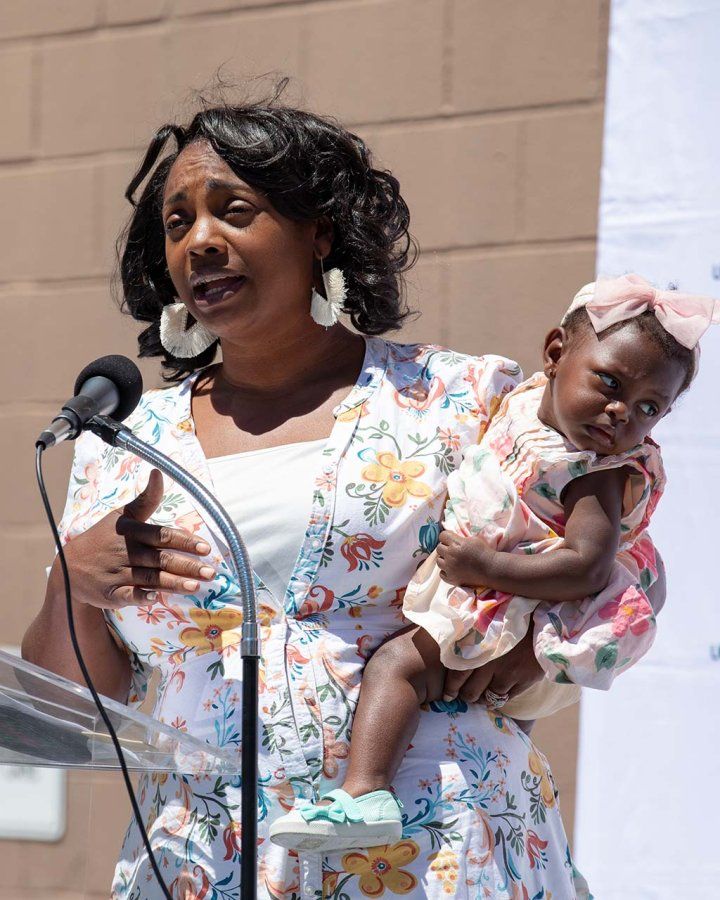For many Black parents, routine medical visits are often characterized by not being listened to, not being taken seriously, and being misunderstood by health care providers. For Black parents of young children, a lack of cultural understanding can have dire consequences for the health of the baby and the mother.
Black babies in the Bay Area are two to three times more likely to be born prematurely, too small, or die before their first birthday than white babies, according to the California Department of Public Health. Scientific evidence points to structural racism and a systemic lack of cultural awareness by providers as contributing to these disparities.

To address these and other health disparities and improve the overall health of Black children and families, UCSF Benioff Children’s Hospital Oakland is launching a new initiative this month called “BLOOM: Black Baby Equity Clinic.” The new clinic will match Black babies from newborn to their third year of age with a medical team of their race.
The medical team includes Black pediatricians, social workers, lactation specialists, therapists, and health educators who are trained to understand the social, cultural, and racial challenges that families face every day.
“This clinic is for Black families who feel their concerns for their baby’s care,” said Dr. Dana Long, co-founder of the Black Baby Equity Clinic. “Here Black parents will know they are valued and their babies will be loved.”
Hope Williams-Burt, a mother of four children (her youngest is 11 months old), said her interaction with Long treating her young daughter was unlike any she had had with her previous three newborns. He said it was different.
“Dr. Long has given me peace of mind as a parent,” Williams-Bart said. “I trusted her right away because she understood what I was talking about and she had the courage and freedom to tailor care to her baby’s needs. There was no need to explain unnecessarily. She just understands.”
Comprehensive mind and body health care
Recognizing the diversity of Black experiences, intergenerational trauma, and mistrust in the health care system is what led co-founders Long and Javey Ross, M.D., of the Benioff Oakland Primary Care Clinic at the University of California, San Francisco. It is at the center of “BLOOM: Black Baby Equity,” a concept conceived by a pediatrician.
“We have seen firsthand how systemic bias impacts the health and well-being of our families,” Ross said. “We are ready to change the narrative.”
Multidisciplinary Black pediatricians from Benioff Children’s Hospital in Oakland and San Francisco, trained in cultural humility and trauma-informed care, come together every Friday to heal, treat, and counsel families. In an exam room in the primary care wing of Oakland’s Benioff Children’s Hospital on Claremont Avenue, parents share physical, psychological, and environmental challenges and celebrate the joy of having a baby. Topics include basic unmet needs such as breastfeeding, first words and smiles, a good night’s sleep, and food and housing insecurity.
Research from the Association of American Medical Colleges shows that racial concordance between patients and healthcare providers improves healthcare utilization and outcomes, reduces stress, and improves patient satisfaction. . Parents say they feel safer, more trustworthy, and less judged when they have a provider of their race.
A team of research assistants at the University of California, San Francisco, led by Nicole Busch, Ph.D., a professor in the Department of Psychiatry, Department of Behavioral Sciences, and Pediatrics, and Kayla Karvonen, M.D., Ph.D., a neonatology fellow, will track and measure the effects of wraparound. They will be looking at the physical and mental health of Black parents and their babies and evaluating the outcomes.
The goal is to match 100% of patients with a provider of the same racial background, something Long and Ross acknowledged is a challenge, as the number of Black pediatricians is alarmingly low according to the Association of American Medical Colleges. Among practicing pediatricians in the United States, 5% are black, 56.2% are white, 17.1% are Asian, and 5.8% are Hispanic.
“For most of my life, I never had the opportunity to be treated by a black doctor,” Long said. My three Black sons have also never had the privilege of being treated by a Black physician, let alone a Black primary care pediatrician. I know how important this is to Black families. ”
Black pediatricians are underrepresented and in great need in the Black community for a cultural understanding of systemic racism in health care that is often unrecognized by white healthcare providers.
“My clinic is probably 95 percent black,” Ross said. “My patients stick with me because they feel a connection that goes beyond what I learned in medical school. That’s why I’m passionate about BLOOM. My team and I are now able to connect with Black babies and provide them with equitable health care from the beginning.”





